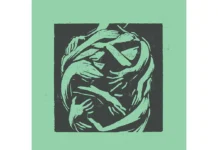OPETH‘s recent releases have been rather polarizing in the metal community. I had no problem at all with the stylistic change on “Heritage” (2011), and in fact I thought it was a logical move after “Watershed” (2008), which already was a clear step away from the traditional OPETH sound. However, while I still love “Heritage,” its follow-up, “Pale Communion” (2014), hasn’t aged as well, and I rarely feel the need to revisit it. Somehow PC felt a little safe after the adventurous and quirky “Heritage,” or at least about as safe as a non-death metal OPETH album can be.

Just two years after the previous album, OPETH delivers their 12th studio opus at the end of September. Since the album is rather varied musically, I feel the best way to review it is to give a track-by-track breakdown:
1. “Persephone”
A gentle semi-acoustic intro that reminds me a bit of “Marrow of the Earth” and includes a woman speaking at the end. Two of my favorite OPETH albums – “My Arms, Your Hearse” (1998) and “Heritage” – begin with intro tracks as well, so the formula works well to my ears.
2. “Sorceress”
The title-track and the first single starts off with a fusion jazz-sounding intro until a drop-tuned chugging riff kicks in and the song enters sludgy stoner metal territory. I love how dirty and raw the song sounds, and Mikael Åkerfeldt’s vocals remind me of the late Layne Staley (ALICE IN CHAINS) at times. The melodic outro is nice and the last chord sounds huge. Though I’ve listened to the tune quite a few times since it was released, I’m still not bored of it.
3. “The Wilde Flowers”
The vocal melody in the verses with the heavy rhythm sounds familiar from somewhere, but I can’t put my finger on it. The tune manages to sound ominous yet catchy at the same time. After Fredrik Åkesson’s wild guitar solo and the final chorus there’s a mellow part, which gets gradually louder and leads into an intense and twisted outro. Probably the most typical OPETH song on the album, but very good nonetheless.
4. “Will o the Wisp”
The folky vibe of the second single is a continuation of last album’s “River,” but “Will o the Wisp” has more of the classic OPETH melancholy. Åkerfeldt‘s vocal performance is powerful, there are great harmonies, and the solo at the end is tasty, though it ends a little early because of the fade-out.
5. “Chrysalis”
“Chrysalis” is the polar opposite of “Will o the Wisp”: a fast and heavy rock song. The riffing and the strong role of the Hammond organ evoke “The Baying of the Hounds,” and the vocal melody is on the upper end of Åkerfeldt‘s range. There’s also a cool solo duel between Åkesson and keyboardist Joakim Svalberg in the middle. The song calms down at the end and fades out repeating the mantra “leave it all behind you,” but I can’t recall many OPETH songs that remain up-tempo and energetic for 5 minutes like this one does. A definite standout track that has to be played live!
6. “Sorceress 2”
Despite its title, “Sorceress 2” has nothing to do with “Sorceress” musically. Steven Wilson‘s influence is all over this acoustic piece: the shifting between minor and major keys sounds like something PORCUPINE TREE would do, and Åkerfeldt‘s falsetto delivery is quite Wilson-esque. I can also hear echoes of “Coil” and Storm Corrosion. The song is atypically light for an OPETH ballad, but it works.
7. “The Seventh Sojourn”
A mostly instrumental track with percussion, strings, and an oriental vibe – vocals don’t come in until the very end and they are rather quiet. Though you can hear that this is OPETH, the song has a soundtrack feel that the band has never really explored before. For me this is the weak point of the album, because I feel its potential wasn’t used to the fullest. It would work better either as a short interlude or the first part of a longer piece.
8. “Strange Brew”
The longest and most complex song on the album starts off atmospheric, but after a couple of minutes it goes into a fusion jazz section and then one of the heaviest moments on the album, where Åkerfeldt’s raspy vocals alternate with a chugging riff. My favorite part is the bit after the solos, where the vocal line mimics the bluesy guitar melody. Those who found the songs on “Heritage” too chaotic may be turned off by this one, but I love how cohesive it is despite going into numerous different places.
9. “A Fleeting Glance”
Another folky intro leads into a verse with nothing but harpsichord and falsetto vocals. Once the full band kicks in there’s a nice groove, and later on a heavy riff makes a couple of appearances. I wouldn’t call this a filler, but it’s definitely the least essential non-instrumental track besides “The Seventh Sojourn.”
10. “Era”
The piano intro may make you expect a ballad-y track, but when the full band kicks in, “Era” settles into a fast-paced hard rock flow that wouldn’t be out of place on a FOO FIGHTERS record. The chorus melody is pretty infectious, and Martin Axenrot gets to let loose on the drums. I could imagine OPETH finding new fans if this tune was released as a single and rock radio channels took it into their rotation.
11. “Persephone (Slight Return)”
The title is slightly misleading since this is basically a reprise of the piano intro of “Era.” I’m not sure it needed to be a track of its own, especially when it’s not even a minute long, but I guess the band wanted to bookend the album with two instrumentals. Either way, it’s a nice little cool-down after the rocking “Era,” and the female voice from “Persephone” makes another appearance, closing the circle.
What’s striking about “Sorceress” is how accessible and relatively straightforward most of the album is, at least on OPETH‘s scale. However, there’s enough experimentation and intensity to keep the album from being “OPETH lite,” and the variety between the songs keeps things interesting. Calling this a metal record would be a stretch, but there are more heavy and energetic moments on “Sorceress” than on its two predecessors. Mikael Åkerfeldt‘s melodic vocals are also more diverse than ever before, since there’s both more falsetto and raspy rock singing. The mastering is a little less dynamic and the production is maybe a touch more modern than on the previous two albums, but the record still sounds warm and has a strong vintage aura.
Written by Wille Karttunen
Musicalypse, 2016
OV: 2664
Tracklist
- Persephone
- Sorceress
- The Wilde Flowers
- Will O the Wisp
- Chrysalis
- Sorceress 2
- The Seventh Sojourn
- Strange Brew
- A Fleeting Glance
- Era
- Persephone (Slight Return)
Lineup
Mikael Åkerfeldt – vocals, guitars
Fredrik Åkesson – guitars
Joakim Svalberg – organs, pianos
Martin Méndez – bass
Martin Axenrot – drums, percussion
Label
Nuclear Blast Records
Links
Recent posts
[recent_post_carousel design=”design-1″]






[…] “Sorceress“ (2016) was a perfectly enjoyable OPETH album – apart from its overly bass-heavy mix, which started bugging me once I received the album on CD – but I started to wish the band would change things up a little for the sake of avoiding stagnation. In the chorus of “Era,” the last vocal track on “Sorceress,” Åkerfeldt sang “The end of an era / One starts anew,” and in 2018 the band put out a live release, “Garden of Titans,” so after three albums with a similar formula it seemed like the band had reached a watershed moment (no pun intended), and “In Cauda Venenum” confirms my prediction to be true. […]